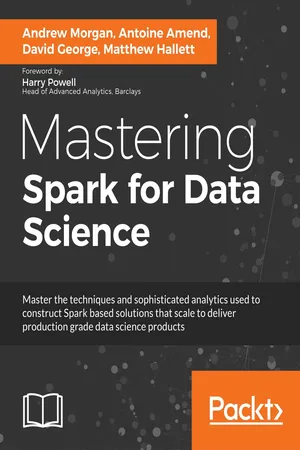
Mastering Spark for Data Science
- 560 pages
- English
- ePUB (mobile friendly)
- Available on iOS & Android
Mastering Spark for Data Science
About this book
Master the techniques and sophisticated analytics used to construct Spark-based solutions that scale to deliver production-grade data science productsAbout This Book• Develop and apply advanced analytical techniques with Spark• Learn how to tell a compelling story with data science using Spark's ecosystem• Explore data at scale and work with cutting edge data science methodsWho This Book Is ForThis book is for those who have beginner-level familiarity with the Spark architecture and data science applications, especially those who are looking for a challenge and want to learn cutting edge techniques. This book assumes working knowledge of data science, common machine learning methods, and popular data science tools, and assumes you have previously run proof of concept studies and built prototypes.What You Will Learn• Learn the design patterns that integrate Spark into industrialized data science pipelines• See how commercial data scientists design scalable code and reusable code for data science services• Explore cutting edge data science methods so that you can study trends and causality• Discover advanced programming techniques using RDD and the DataFrame and Dataset APIs• Find out how Spark can be used as a universal ingestion engine tool and as a web scraper• Practice the implementation of advanced topics in graph processing, such as community detection and contact chaining• Get to know the best practices when performing Extended Exploratory Data Analysis, commonly used in commercial data science teams• Study advanced Spark concepts, solution design patterns, and integration architectures• Demonstrate powerful data science pipelinesIn DetailData science seeks to transform the world using data, and this is typically achieved through disrupting and changing real processes in real industries. In order to operate at this level you need to build data science solutions of substance –solutions that solve real problems. Spark has emerged as the big data platform of choice for data scientists due to its speed, scalability, and easy-to-use APIs.This book deep dives into using Spark to deliver production-grade data science solutions. This process is demonstrated by exploring the construction of a sophisticated global news analysis service that uses Spark to generate continuous geopolitical and current affairs insights.You will learn all about the core Spark APIs and take a comprehensive tour of advanced libraries, including Spark SQL, Spark Streaming, MLlib, and more.You will be introduced to advanced techniques and methods that will help you to construct commercial-grade data products. Focusing on a sequence of tutorials that deliver a working news intelligence service, you will learn about advanced Spark architectures, how to work with geographic data in Spark, and how to tune Spark algorithms so they scale linearly.Style and approachThis is an advanced guide for those with beginner-level familiarity with the Spark architecture and working with Data Science applications. Mastering Spark for Data Science is a practical tutorial that uses core Spark APIs and takes a deep dive into advanced libraries including: Spark SQL, visual streaming, and MLlib. This book expands on titles like: Machine Learning with Spark and Learning Spark. It is the next learning curve for those comfortable with Spark and looking to improve their skills.
Tools to learn more effectively

Saving Books

Keyword Search

Annotating Text

Listen to it instead
Information
Mastering Spark for Data Science
Mastering Spark for Data Science
Credits
| Authors Andrew Morgan Antoine Amend David George Matthew Hallett | Copy Editor Safis Editing |
| Reviewer Sumit Pal | Project Coordinator Shweta H Birwatkar |
| Commissioning Editor Akram Hussain | Proofreader Safis Editing |
| Acquisition Editor Vinay Argekar | Indexer Pratik Shirodkar |
| Content Development Editor Amrita Noronha | Graphics Tania Dutta |
| Technical Editor Sneha Hanchate | Production Coordinator Arvindkumar Gupta |
Foreword
About the Authors
Table of contents
- Mastering Spark for Data Science
Frequently asked questions
- Essential is ideal for learners and professionals who enjoy exploring a wide range of subjects. Access the Essential Library with 800,000+ trusted titles and best-sellers across business, personal growth, and the humanities. Includes unlimited reading time and Standard Read Aloud voice.
- Complete: Perfect for advanced learners and researchers needing full, unrestricted access. Unlock 1.4M+ books across hundreds of subjects, including academic and specialized titles. The Complete Plan also includes advanced features like Premium Read Aloud and Research Assistant.
Please note we cannot support devices running on iOS 13 and Android 7 or earlier. Learn more about using the app